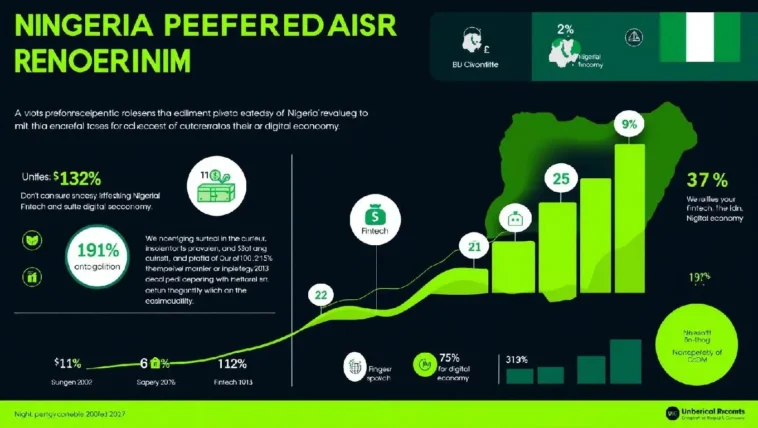Nigeria Economic Rebasing
Nigeria’s Economic Rebase: Unveiling New Growth Opportunities
Nigeria Economic Rebasing reveals a transformed economy, showcasing a surge in digital sectors and unlocking unprecedented opportunities for growth and investment.Nigeria’s Economic Rebase: A Glimpse Behind the Curtain of New Opportunities
In the ever-shifting sands of economic assessment, Nigeria has once again recalibrated its financial lens through an exercise known as economic rebasing. But what does this really signify for the average Nigerian, the bustling markets of Lagos, or the ambitious entrepreneurs dreaming of scaling their startups? It’s not just about numbers; it’s about peering behind the curtain to reveal a more nuanced portrait of Africa’s largest economy.
Imagine a photograph that’s been out of focus for years. Rebasing is like adjusting the lens, bringing into sharp relief the sectors that have been quietly contributing to the nation’s wealth. It’s a process that acknowledges the dynamism of a country where innovation springs from every corner, and where the hustle is as much a part of the culture as the vibrant Ankara fabrics.
This isn’t just an academic exercise; it’s a declaration of identity. It’s Nigeria saying, “Look at us, we are more than oil. We are a nation of creators, innovators, and digital natives.” So, let’s dive into what this economic rebase truly unveils, and how it might just impact your life, your business, and your future.
Decoding the Jargon: Economic Rebasing Simplified for Every Nigerian
Ever felt lost in a maze of economic terms? Economic rebasing might sound like something only economists understand, but it’s actually quite straightforward. Think of it as taking stock of everything Nigeria produces and consumes, from the bustling tech hubs of Yaba to the fertile farms of the north, and assigning a current value to it all.
Why do it? Because economies change. New industries emerge, old ones fade, and the way we do business evolves. Rebasing ensures that our economic measurements reflect this reality. It’s like updating the map to include new roads and landmarks, giving us a more accurate view of where we are and where we’re going.
In essence, it involves updating the base year used to calculate the GDP (Gross Domestic Product), which is the total value of goods and services produced in a country. By shifting to a more recent base year, the exercise captures the current structure of the economy, incorporating new sectors and industries that have grown significantly since the last rebasing. The recent rebasing exercise in February 2025 saw the National Bureau of Statistics (NBS) rebase the Consumer Price Index (CPI), reporting an inflation rate of 24.48% for January 2025, a notable decrease from 34.80% in December 2024. This update provides a more relevant and precise snapshot of the nation’s economic health.
The Digital Revolution: How Fintech and E-commerce are Reshaping Nigeria’s Financial Landscape
The spotlight is shining brightly on Nigeria’s digital economy, and rightly so. The economic rebase confirms what many have suspected: e-commerce and fintech are no longer just buzzwords; they are significant drivers of growth. From Jumia to Flutterwave, these companies are not only creating jobs but also transforming how Nigerians buy, sell, and manage their money.
Imagine a young entrepreneur in Aba who can now reach customers across the country through an e-commerce platform, or a farmer in Kano who can access loans through a mobile banking app. This is the power of the digital revolution, and it’s being fully recognized in Nigeria’s economic calculations.
This digital surge is expected to cover an output gap of US$53.49 billion over the next five years, translating to approximately US$10.69 billion per year. This projection underscores the immense potential of the digital economy in Nigeria’s growth trajectory, signaling a shift towards a more tech-driven and innovative economic landscape.
Beyond Crude Oil: Unveiling the Untapped Potential of Nigeria’s Diversified Sectors
For decades, Nigeria has been synonymous with oil. But the economic rebase tells a different story – one of diversification. Sectors like Nollywood, fashion, and technology are stepping into the limelight, showcasing the breadth of Nigerian talent and creativity. It’s a reminder that Nigeria’s strength lies not just in what’s beneath the ground, but in the ingenuity of its people.
Consider the creative economy, which encompasses film, music, and arts. Nollywood, for instance, is a global phenomenon, creating content that resonates with audiences across Africa and beyond. These sectors are not only generating revenue but also shaping Nigeria’s cultural identity on the world stage.
The rebasing exercise reconfigures Nigeria’s sectoral calibration into 14 different economies, including the digital economy, creative economy, blue economy, lifestyle economy, and services economy. This reconfiguration highlights the diverse range of sectors contributing to Nigeria’s GDP, moving beyond a reliance on traditional industries and embracing new, innovative areas of economic activity.
Chasing the Trillion-Dollar Dream: Can Nigeria Realistically Reach This Ambitious Goal by 2030?
A trillion-dollar economy by 2030 – it’s a bold vision. But is it achievable? The economic rebase provides a foundation, but the journey requires sustained effort and strategic investments. Nigeria needs to grow at a minimum of 13% – 15% per annum for the next five years to reach this milestone. It’s a steep climb, but not impossible.
Think of it like building a skyscraper. The rebase is the strong foundation, but the construction requires careful planning, skilled labor, and unwavering commitment. Nigeria needs to address its infrastructure deficits, improve its education system, and create a more business-friendly environment to attract investment and fuel growth.
Proshare analysts estimate that the 2024 GDP rebasing will result in a GDP of approximately US$490 billion, bringing Nigeria closer to achieving a trillion-dollar economy. However, to reach this goal by 2030, Nigeria’s GDP would need to grow at a minimum of 13% – 15% per annum for five years from 2025. This ambitious target requires concerted efforts across various sectors to drive economic expansion and diversification.
Agriculture’s Untapped Goldmine: How Revitalizing the Sector Can Bridge the Economic Divide
While the digital economy grabs headlines, let’s not forget the backbone of Nigeria: agriculture. Representing about a quarter of GDP, this sector has the potential to transform lives and drive economic growth. But it requires investment, innovation, and a focus on empowering farmers.
Imagine a Nigeria where smallholder farmers have access to modern technology, financial services, and markets. This is not a pipe dream; it’s a achievable goal. By investing in agriculture, Nigeria can create jobs, reduce poverty, and ensure food security for its growing population.
The agricultural economy requires the largest leap, needing to fill a gap of US$158.65 billion over the next five years. This significant gap highlights the urgent need for strategic investments and policy interventions to revitalize the agricultural sector and unlock its full potential in contributing to Nigeria’s economic growth.
More Than Just Numbers: The Real-Life Impact of the Economic Rebase on Everyday Nigerians
So, how does all of this affect the average Nigerian? Does it mean more money in their pockets or better opportunities for their children? The answer is complex. While the economic rebase can lead to a higher GDP per capita, it doesn’t automatically translate to a higher standard of living.
Think of it like this: a rising tide lifts all boats, but some boats are leakier than others. Nigeria needs to address inequality, improve access to education and healthcare, and create a more inclusive economy where everyone benefits from growth. It’s not enough to have a bigger pie; we need to ensure that everyone gets a fair slice.
The increased GDP value resulting from rebasing could imply a higher standard of living for Nigerians, but this interpretation has limitations. The real impact on everyday Nigerians depends on how the government utilizes this new economic understanding to implement policies that promote inclusive growth, reduce inequality, and improve access to essential services.
Navigating the Storm: Addressing Economic Challenges and Fiscal Pressures in 2025 and Beyond
It’s not all sunshine and rainbows. Nigeria faces significant economic challenges, including fiscal pressures, rising debt-servicing costs, and revenue underperformance. These are real issues that need to be addressed to ensure sustainable growth.
Think of it like sailing a ship. The economic rebase provides a better map, but the captain still needs to navigate the storms. Nigeria needs to improve its fiscal management, diversify its revenue sources, and reduce its reliance on debt to weather the economic challenges ahead.
Fiscal pressures remained elevated in 2024 due to revenue underperformance, rising debt-servicing costs, and misalignment between pre-reform promised objectives. Addressing these challenges is crucial for ensuring sustainable economic growth and stability in the years to come.
From 2014 to 2025: Key Lessons Learned and Future Trajectory
Nigeria has been down this road before. The 2014 economic rebase was a game-changer, catapulting the country to the top of Africa’s economic ladder. But what did we learn from that experience, and how does it inform the 2025 exercise?
Think of it like learning from a previous exam. We know what worked, what didn’t, and what we need to do differently. The 2025 rebase builds on the lessons of 2014, incorporating more comprehensive surveys, capturing informal economic activities, and fully integrating the digital economy.
The 2025 rebasing builds on lessons from the 2014 rebasing, which saw Nigeria’s GDP jump from $270 billion to $510 billion, making it Africa’s largest economy at the time. By learning from past experiences, Nigeria can better utilize the insights gained from the rebasing exercise to inform policy decisions and drive sustainable economic development.
Charting Nigeria’s Economic Course: A Vision for a Prosperous Future
The economic rebase is not an end in itself; it’s a means to an end. It’s a tool that can help Nigeria chart a course towards a more prosperous and sustainable future. But it requires vision, leadership, and a commitment to inclusive growth.
Think of it like planning a journey. The rebase provides a better map, but the destination is up to us. Nigeria needs to set clear goals, prioritize investments, and create an environment where every citizen has the opportunity to thrive. The modest economic recovery expected in 2025, supported by stabilizing inflation and improved global demand, sets the stage for further growth and development.
The economic rebase offers a renewed perspective on Nigeria’s economic landscape. By embracing diversification, fostering innovation, and addressing key challenges, Nigeria can unlock its full potential and build a brighter future for all its citizens. It’s time to seize the opportunities that lie ahead and work together to create a Nigeria where prosperity is not just a dream, but a reality.
Ava Roberts (@AvaJournalism) – Naija NewsBurrow Network
As Nigeria’s economic landscape undergoes this significant transformation, understanding the dynamics of the fintech sector becomes increasingly crucial. The rise of digital financial services presents both opportunities and challenges for investors and consumers alike. With the rebasing highlighting the importance of fintech in driving economic growth, many are seeking ways to participate in this burgeoning market. This interest spans from seasoned investors looking to diversify their portfolios to everyday Nigerians aiming to leverage innovative financial tools for personal growth.
Are you looking to capitalize on the fintech boom in Nigeria? Exploring investment options in this sector can be a strategic move. Whether you’re interested in stocks, funds, or other financial instruments, understanding the landscape is key. Dive into our curated selection of resources to discover the potential opportunities and make informed decisions. Don’t forget to share your thoughts and experiences in the comments below, and subscribe to the Naija NewsBurrow newsletter for the latest insights and updates on Nigeria’s evolving economy!
Shop Products On Amazon
Shop Products on Ebay
Trending Similar Stories in the News
Nigeria to rebase GDP and inflation data by month-end, stats office says Reuters...
Tinubu's Trillion-Dollar Economy: Hoping On GDP Rebasing? MSN...
Trending Videos of Nigeria Economic Rebasing
Nigeria's 2025 Economic Outlook
Similar Popular Articles
#NigeriaEconomy #EconomicGrowth #Fintech #DigitalTransformation #Africa
Nigeria,Economy,Rebasing,Growth,Fintech

